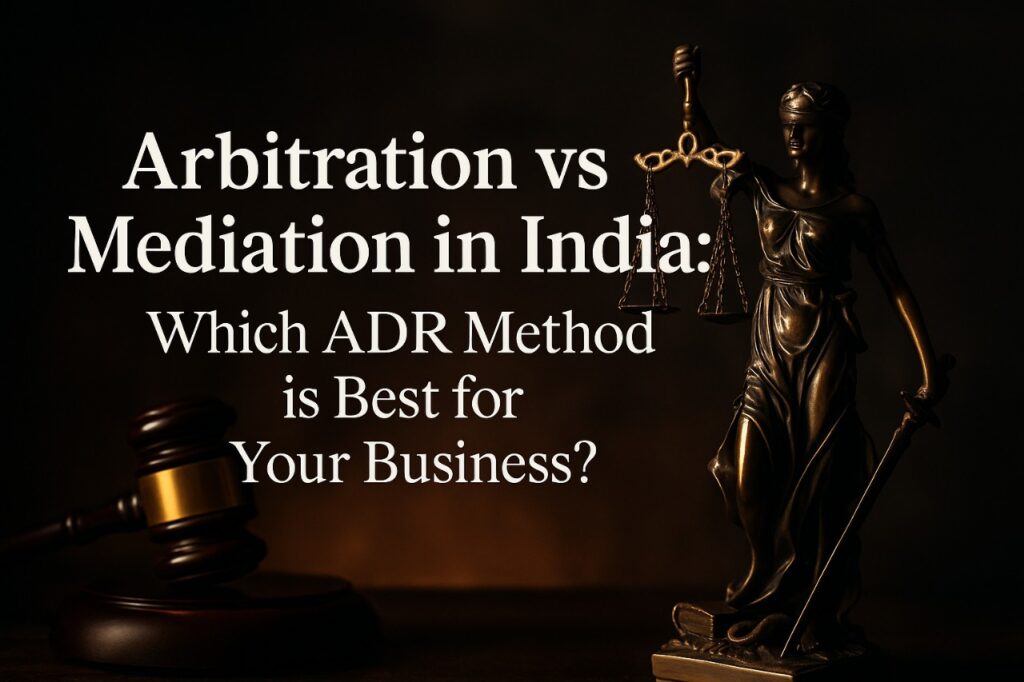
Introduction
In India’s dynamic business environment, disputes can arise at any stage viz. from vendor disagreements to partnership fallouts. However, resorting to traditional litigation isn’t always ideal. It’s often time-consuming, expensive, and public. That’s why many Indian businesses are now turning to Alternative Dispute Resolution (ADR) mechanisms like Arbitration and Mediation to resolve conflicts efficiently and privately.
But which option should you choose? Let’s explore the differences and help you decide what works best for your business.
What is Arbitration?
Arbitration in India is governed by the Arbitration and Conciliation Act, 1996, which aligns with international standards through various amendments. In this process, a neutral third party i.e. the arbitrator who hears both sides and delivers a binding decision.
Key Features of Arbitration in India
- Legally binding and enforceable award
- Conducted in private, often faster than court trials
- Flexible in procedure but structured like litigation
- Can be domestic or international (in case of cross-border contracts)
What is Mediation?
Mediation is a collaborative process in which a neutral mediator helps the parties communicate, negotiate, and arrive at a mutually agreeable resolution. Under the newly enacted Mediation Act, 2023, India has taken a significant step towards institutionalizing Mediation.
Highlights of Mediation in India:
- Voluntary and non-binding, unless parties agree to formalize it
- Confidential and flexible
- Great for preserving long-term business relationships
- Supported by Mediation centres and legal aid authorities across India
Arbitration vs Mediation: A Comparative Overview
| Feature | Arbitration | Mediation |
| Legal Status | Binding and enforceable | Non-binding unless converted into a settlement |
| Cost | Moderate to high | Generally low |
| Time Taken | Several months to a year | Few weeks to a few months |
| Privacy | Yes | Yes |
| Control Over Outcome | Arbitrator decides | Parties decide together |
| Suitable For | Complex legal or financial disputes | Relationship-sensitive or communication-based issues |
When Should Indian Businesses Choose Arbitration?
Opt for Arbitration if:
- The dispute involves high-value contracts or complex legal issues
- A quick, enforceable resolution is required
- You prefer a private forum outside the court system
- You have an existing Arbitration clause in your contract
Arbitration is especially common in sectors like construction, infrastructure, finance, and International trade.
When is Mediation a Better Fit in the Indian Context?
Choose Mediation if:
- You value maintaining a commercial relationship
- The dispute is less about legality and more about misunderstanding
- Cost and time are critical concerns
- You’re open to a non-adversarial, cooperative process
Mediation is ideal for family-run businesses, start-up founders, vendor-partner conflicts, and service delivery disputes.
The Rise of ADR in India
India is actively promoting ADR as a method of easing judicial burdens:
- Institutional Arbitration centres like the Mumbai Centre for International Arbitration (MCIA), Delhi International Arbitration Centre (DIAC), and Nani Palkhivala Arbitration Centre are gaining ground.
- Court-annexed Mediation centres and private Mediation platforms are also expanding under the Mediation Act.
With an evolving ADR ecosystem, businesses across India are now better equipped to resolve disputes on their own terms.
Conclusion: Tailor Your ADR Strategy to Your Business Needs
There’s no universal answer to the “Arbitration vs Mediation” question. Each dispute is different, and the right path depends on your business objectives, the value of the dispute, and the importance of your relationship with the other party.
Both Arbitration and Mediation offer structured, time-saving, and confidential alternatives to conventional litigation. However, each path comes with its unique strengths:
- Arbitration offers a formal, legally binding resolution for disputes where clarity, enforceability, and finality are crucial.
- Mediation, on the other hand, provides a collaborative, cost-effective space to preserve valuable relationships and foster win-win outcomes.
In India, the legal framework is rapidly adapting to encourage the use of these mechanisms. Courts are overburdened, and businesses are increasingly recognizing that time spent in prolonged litigation is time taken away from growth and innovation. With the introduction of the Mediation Act, 2023, and strong institutional support for domestic and international Arbitration, ADR is no longer an alternative and it is becoming the preferred route for smart, forward-looking companies.
That said, choosing the right ADR strategy is not just about process, it is about understanding the nature of your business, your industry, your stakeholders, and your risk appetite. The wrong approach can escalate tensions, while the right one can strengthen reputations, preserve partnerships, and protect bottom lines.
Author Name
By Ananthakesavan V
